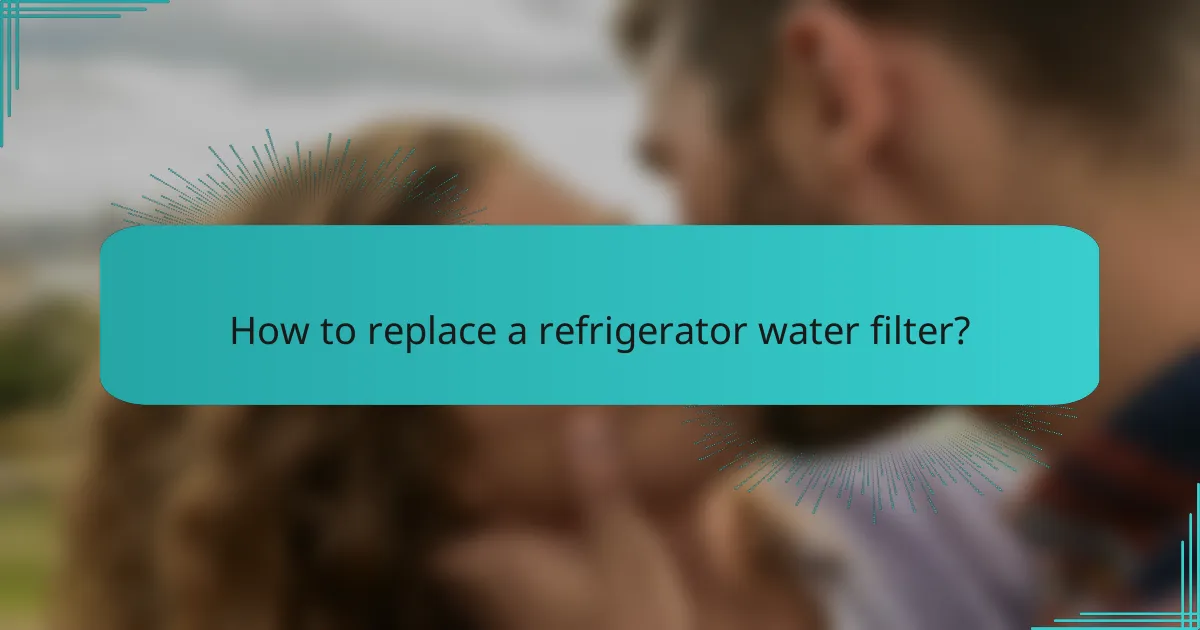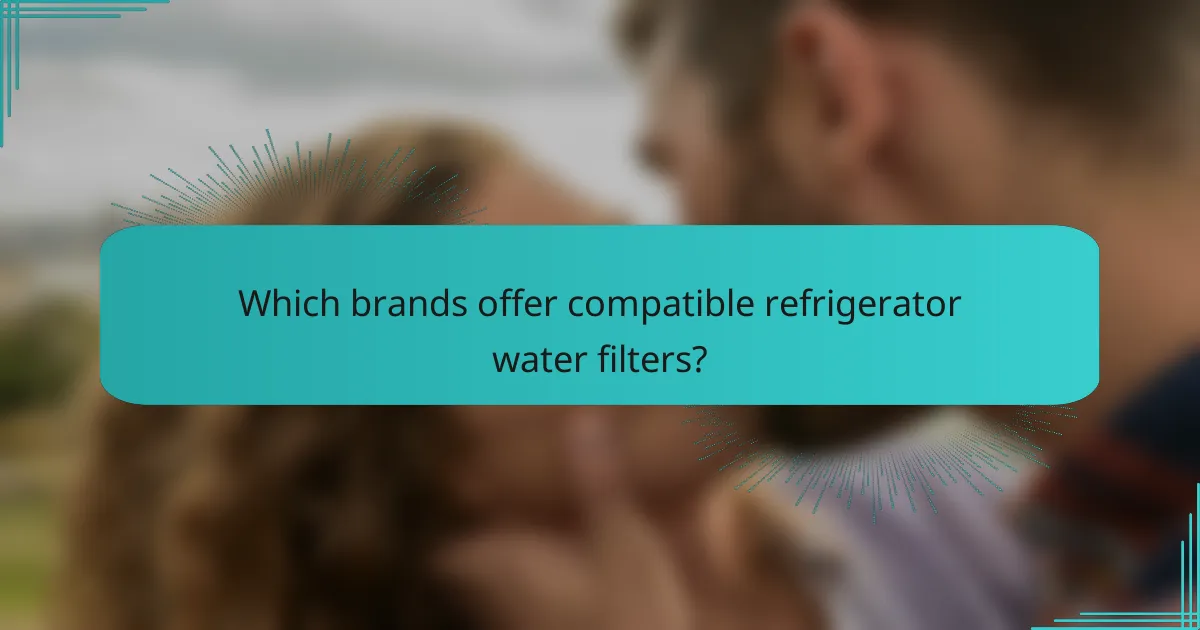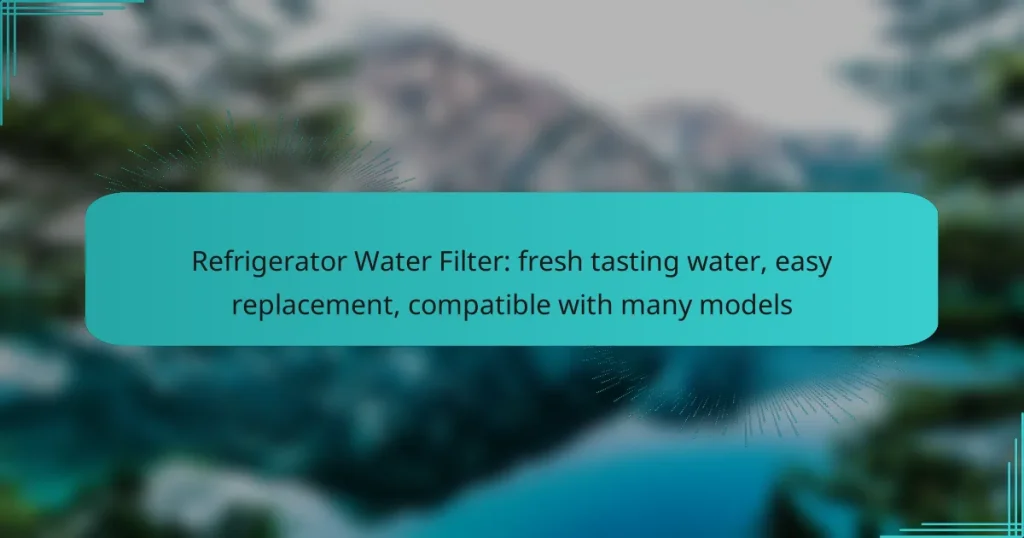A refrigerator water filter is essential for enjoying fresh-tasting water right from your fridge. Designed for easy replacement, these filters are compatible with many refrigerator models, ensuring that you can maintain the quality of your drinking water effortlessly. Regularly changing the filter not only enhances the taste and odor of your water but also removes contaminants, providing you with safe and enjoyable hydration at home.

How to choose the best refrigerator water filter in the UK?
To choose the best refrigerator water filter in the UK, consider compatibility with your refrigerator model, the filter’s lifespan, certification standards, and cost-effectiveness. These factors will ensure you get fresh-tasting water while making maintenance easy and affordable.
Compatibility with refrigerator models
When selecting a water filter, ensure it is compatible with your specific refrigerator model. Most manufacturers provide a list of compatible filters, so check your fridge’s manual or the manufacturer’s website for recommendations. Using an incompatible filter can lead to poor water quality or damage to your appliance.
Common brands like Samsung, LG, and Whirlpool have filters designed for their models, but many third-party options are also available. Always verify compatibility before making a purchase to avoid issues.
Filter lifespan and replacement frequency
Filter lifespan typically ranges from six months to a year, depending on usage and water quality. Regularly replacing your filter is crucial for maintaining fresh-tasting water and optimal filtration efficiency. Some filters come with indicators to remind you when it’s time for a change.
As a general rule, if your water starts to taste or smell off, it may be time to replace the filter sooner than the recommended schedule. Keeping track of your filter’s lifespan can help you avoid unexpected replacements.
Certification standards for water filters
Look for filters that meet certification standards such as NSF/ANSI 42 and 53, which ensure they effectively reduce contaminants and improve taste. These certifications indicate that the filter has been tested and meets specific performance criteria.
Choosing a certified filter not only guarantees better water quality but also provides peace of mind regarding safety. Always check for certification labels on the packaging or product description before purchasing.
Cost-effectiveness of different brands
When evaluating the cost-effectiveness of water filters, consider both the initial purchase price and the long-term replacement costs. While some premium brands may have a higher upfront cost, they often provide better filtration and longer lifespans, which can save you money over time.
Compare prices among different brands and look for bulk purchase options or subscription services that may offer discounts. Reading customer reviews can also help you assess whether a filter delivers good value for its price.

What are the benefits of using a refrigerator water filter?
Using a refrigerator water filter provides several advantages, including improved taste and odor of water, removal of contaminants, and the convenience of having filtered water readily available at home. These filters enhance the quality of drinking water, making it safer and more enjoyable.
Improved taste and odor of water
Refrigerator water filters significantly enhance the taste and smell of tap water. By removing chlorine and other chemicals, these filters provide a fresher, cleaner flavor that encourages more frequent hydration.
Many users report that filtered water tastes better than unfiltered, making it a preferred choice for drinking and cooking. This improvement can be particularly noticeable in areas with hard water or high mineral content.
Removal of contaminants and impurities
Refrigerator water filters are designed to reduce various contaminants and impurities, including lead, mercury, and sediment. Most filters meet or exceed standards set by organizations like NSF International, ensuring that harmful substances are effectively removed.
Regular replacement of filters is crucial, as this ensures optimal performance. Many filters can last for several months, depending on usage and water quality, so it’s important to check manufacturer recommendations for replacement intervals.
Convenience of having filtered water at home
Having a refrigerator water filter offers the convenience of access to clean, filtered water without the need for bottled water. This not only saves money but also reduces plastic waste, making it an environmentally friendly option.
Most refrigerator water filters are easy to install and replace, often requiring no tools. Users can typically complete the replacement in just a few minutes, ensuring that fresh-tasting water is always on hand for drinking and cooking.

How to replace a refrigerator water filter?
Replacing a refrigerator water filter is a straightforward process that ensures you have fresh tasting water. Regular replacement is crucial for maintaining water quality and the efficiency of your refrigerator’s water system.
Step-by-step replacement instructions
Start by locating the water filter compartment, usually found inside the refrigerator or at the back. Turn off the water supply to prevent leaks, then remove the old filter by twisting or pulling it out, depending on the model. Insert the new filter by aligning it correctly and securing it in place.
After replacing the filter, turn the water supply back on and run water through the dispenser for a few minutes to clear any air bubbles or contaminants. Check for leaks around the filter area to ensure a proper seal.
Tools required for replacement
Typically, no special tools are needed for replacing a refrigerator water filter. However, having a towel handy can help catch any spills during the process. If your model requires a wrench for a more secure fit, ensure you have one that fits the filter’s specifications.
Common mistakes to avoid
One common mistake is not turning off the water supply before starting the replacement, which can lead to spills. Another pitfall is failing to properly align the new filter, resulting in leaks or reduced water quality. Always check the compatibility of the filter with your refrigerator model to avoid installation issues.
Lastly, neglecting to run water through the dispenser after installation can leave air in the system, affecting water flow and taste. Always follow the manufacturer’s instructions for optimal results.

Which brands offer compatible refrigerator water filters?
Many brands provide compatible refrigerator water filters, ensuring access to fresh-tasting water. Popular brands include Brita, Samsung, and Whirlpool, each offering filters designed for specific refrigerator models.
Brita water filters
Brita water filters are well-known for their effectiveness in improving water taste and quality. They typically use activated carbon to reduce contaminants such as chlorine and sediment, making water more palatable.
When selecting a Brita filter, ensure compatibility with your refrigerator model. Brita filters are often easy to replace, with a straightforward installation process that usually requires no tools.
Samsung refrigerator filters
Samsung refrigerator filters are designed to fit various Samsung models, providing clean and refreshing water. These filters often utilize advanced filtration technology to remove impurities, including lead and other harmful substances.
Replacing a Samsung filter is generally a simple task, with many models featuring a twist-and-lock mechanism. Regular replacement is recommended every six months to maintain optimal performance and water quality.
Whirlpool water filters
Whirlpool water filters are compatible with many Whirlpool refrigerators and are designed to enhance the taste of drinking water. These filters effectively reduce chlorine taste and odor, along with other contaminants.
For best results, replace Whirlpool filters approximately every six months. Installation is usually straightforward, often involving a simple snap-in or twist mechanism, making it easy for users to maintain their water quality.

What are the costs associated with refrigerator water filters?
The costs associated with refrigerator water filters can vary based on the type of filter, brand, and model compatibility. Generally, you can expect to spend on the filter itself, potential installation fees, and savings from reduced bottled water purchases.
Average price range for filters
Refrigerator water filters typically range from around $30 to $60 each, depending on the brand and filtration technology. Some premium filters may cost more, while generic options can be found for less. It’s advisable to check compatibility with your refrigerator model before purchasing.
Long-term savings on bottled water
Using a refrigerator water filter can lead to significant savings compared to buying bottled water. For example, if a family spends around $30 to $50 monthly on bottled water, switching to filtered water could save hundreds of dollars annually. Over time, these savings can offset the cost of the filter itself.
Installation costs if hiring a professional
If you choose to hire a professional for installation, expect to pay between $50 and $150, depending on the complexity of the job and local labor rates. Many filters, however, are designed for easy DIY installation, which can save you this expense. Always consult the installation instructions to determine if professional help is necessary.

What are the signs that a refrigerator water filter needs replacement?
A refrigerator water filter typically needs replacement when you notice changes in water taste or odor, reduced water flow, or the filter has reached its recommended lifespan. Regularly monitoring these signs ensures you maintain fresh-tasting water and optimal performance from your refrigerator.
Changes in water taste or odor
One of the most noticeable signs that a refrigerator water filter needs replacement is a change in the taste or odor of the water. If your water starts to taste metallic, musty, or has a chlorine-like smell, it indicates that the filter is no longer effectively removing impurities.
These changes can occur as contaminants build up in the filter over time. It’s advisable to replace the filter every six months or sooner if you notice any significant changes in taste or odor. Regular replacements help ensure that your drinking water remains clean and refreshing.
Reduced water flow
A decrease in water flow from the refrigerator’s dispenser is another key indicator that the water filter may need replacement. If you notice that it takes longer to fill a glass or the flow is noticeably weaker, the filter could be clogged with contaminants.
To maintain optimal water flow, check the filter regularly and replace it if the flow rate drops significantly. This not only improves convenience but also ensures that your refrigerator operates efficiently.
Filter lifespan
Most refrigerator water filters have a recommended lifespan, typically ranging from six months to one year, depending on usage and water quality. It’s essential to keep track of when you last replaced the filter to avoid delays in water purification.
Some refrigerators have indicator lights that alert you when it’s time to change the filter. If your model lacks this feature, consider marking your calendar or setting a reminder to ensure timely replacements and maintain the quality of your drinking water.


